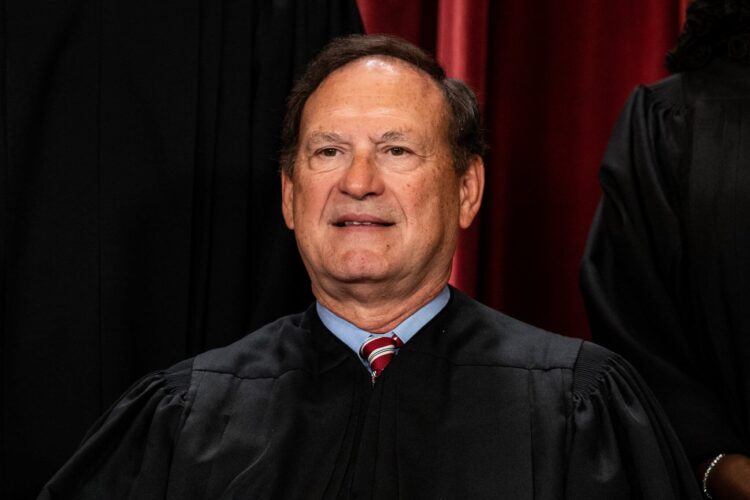Supreme Court Justice Samuel Alito has refused to recuse himself from forthcoming cases tied to the January 6, 2021, Capitol riot and the 2020 election disputes in a decisive move that has sparked significant discourse across political and legal spectrums. This decision comes after the controversy surrounding flags displayed at his residences, which critics argue symbolize political biases potentially influencing his judicial impartiality.
The heart of the controversy involves two flags — an upside-down American flag and an “Appeal to Heaven” flag — both associated with right-wing political statements and, by some, linked directly to the “Stop the Steal” movement that falsely contested the 2020 election results. Reports first surfaced in The New York Times, pointing out that these flags were flown at Alito’s Virginia home and his New Jersey vacation property. The upside-down flag, mainly, is traditionally a distress signal but has been co-opted by some groups protesting Donald Trump’s electoral defeat in 2020.
Justice Alito responded to the allegations and calls for his recusal in detailed letters addressed to Senate Judiciary Committee Chair Dick Durbin (D-Ill.) and Senator Sheldon Whitehouse (D-R.I.), as well as to a group of 50 House Democrats. In these communications, Alito firmly stated that he had no involvement with flying these flags, emphasizing that the actions were solely those of his wife, Martha-Ann Alito, who he asserts was exercising her First Amendment rights as a private citizen.
“My wife is fond of flying flags. I am not,” Alito clarified in his letters, distancing himself from the symbols’ direct or indirect implications. He elaborated that his wife’s decision to fly the upside-down flag stemmed from a personal dispute with neighbors rather than political motivations. Regarding the “Appeal to Heaven” flag, Alito noted his unfamiliarity with its recent political connotations and maintained that his wife did not intend to align with any political movement through its display.
This incident has brought to the forefront the broader issue of judicial ethics and the standards surrounding recusal. According to the Supreme Court’s code of ethics, justices must avoid making political statements to preserve their impartiality on matters before the court. Critics argue that the symbolism of the flags and their timing—particularly the proximity to key political events—cast doubt on Alito’s ability to remain unbiased in cases that are deeply intertwined with political controversies from the Trump era.
The cases in question include significant matters such as Trump’s claim of presidential immunity from prosecution related to his attempts to overturn the election results, alongside other charges stemming from the Capitol riot. The outcomes of these cases could have profound implications on the interpretation of executive power and accountability, making the integrity and impartiality of the justices presiding over them critically important.
In his response to the recusal calls, Alito asserted that a reasonable person, devoid of political or ideological motivations, would not see the events as meeting the standard for recusal. He expressed a sense of duty to continue participating in the adjudication of these cases, stating, “I am therefore duty-bound to reject your recusal request.”
This stance has fueled further debate among lawmakers and prompted discussions about the adequacy of current ethical guidelines for Supreme Court justices. Senator Durbin has been vocal in advocating for a revamped ethics code for justices, highlighting the need for more stringent regulations in light of this and similar controversies involving other justices.
The pushback from Justice Alito and some of his peers against enhanced ethical oversight from Congress underscores a significant tension between the legislative and judicial branches. Justices, including Alito, have argued that Congress lacks the authority to impose such rules on the Supreme Court, emphasizing the court’s constitutional independence.
As the Supreme Court prepares to release its decisions on the related cases, the public and legal communities are closely watching not only for the outcomes of these landmark cases but also for the broader implications they might have on judicial conduct and the balance of powers within the U.S. government.
Justice Alito’s refusal to recuse himself continues to stir a mix of support and criticism. Supporters laud his commitment to judicial duty and legal principles. At the same time, detractors worry about the potential erosion of public trust in an impartial judiciary, especially in cases with heavy political overtones.
As this debate unfolds, it highlights the ongoing challenges in maintaining the delicate balance between judicial independence and accountability, a cornerstone of democratic governance and legal integrity in the United States. The resolution of this issue will likely resonate far beyond the immediate legal battles, shaping discussions about the judiciary’s role in a politically divided nation.










